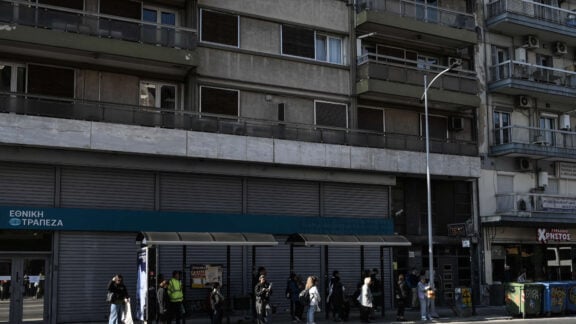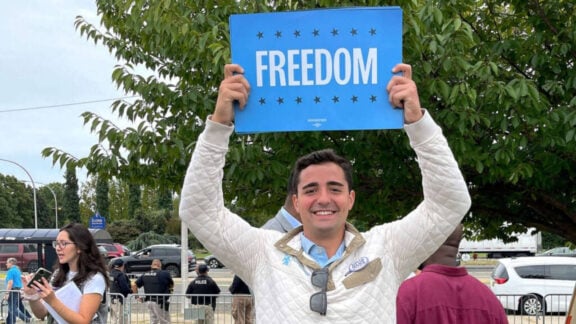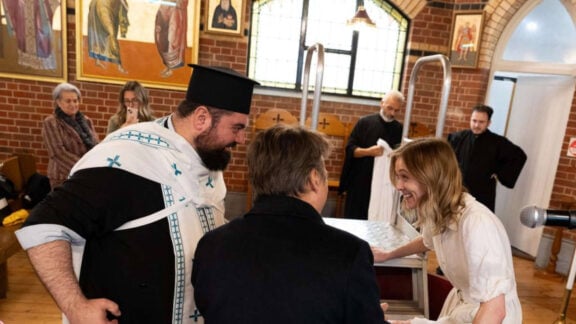The television mini series The Slap, based on Christos Tsiolkas’ book of the same name, will screen in Greece next month. The internationally acclaimed Greek Australian writer told Neos Kosmos: “a Greek channel has picked up the mini series and will screen sometime in May”.
“I am eager to hear the reaction of the Greek audience,” Christos said with ostensible sense of expectation.
“The book has done pretty well in Greece and I can only be hopeful the series will receive the same positive reception” he added.
I caught up with Christos before his conversation with accomplished journalist and author George Megalogenis about Megalogenis’ latest book The Australian Moment, an optimistic assessment of Australia’s future and its place in the world.
During our conversation Christos revealed he has began his new project, tentatively entitled Barracuda.
The fish? I asked.
“Yes, the fish,” he responded with a chuckle.
Where did the name come from? I asked.
“Well, the theme of the book is a young swimmer who aspires to become an Olympic swimmer. His mother is Greek and his father is Irish and Scottish. A very interesting mix to explore, I would say. Barracuda is a prolific, tough swimmer hence the connection”.
Why have you picked him, Christos?
“It’s a really good question. After the success of The Slap, I have been thinking a lot about the meaning of success and the meaning of failure. I guess it’s something about sports, maybe because I grew up in this country. It’s something about the purity of sports people that I really like and the way they manage success and failure.
“Look, it doesn’t matter how successful or acclaimed you are as an artist. There is always that nagging doubt, are you really good? I attribute my interest to the purity of the sport persons in the sense that in swimming the best swimmer is the one who first touches the tiles at the end of each race, the one who breaks records, he who gets to the top or fails based on his own ability”.
Does your main character reflect your uncertainty about your achievements?
“I think that’s where it began and it developed to something else. I follow him from 13 years old until he is 35, a long period in his life and I am interested on how he deals with the fact he does not become a top swimmer. I’d rather not say much more at this stage. I do not want to jinx the project.”
The mini series The Slap proved a great success in Australia, while sales of your book in Greece were extremely high. Any approaches from any Greek channels interested in screening the series? I ask.
“Funny you ask this. I was in Greece a couple of weeks ago and I was informed one Greek channel has picked up The Slap and will screen it next month. The reception of the book by the Greeks has being great and I will be interested to hear about the reaction of the Greek television audiences,” he responds.
How has success affected you? I ask the boy from Preston who has made headlines in Australia and abroad.
“It has given me an economic freedom necessary for the unimpeded continuation of my work. I feel very fortunate in this respect. However, success has not changed my character, my way of thinking. I have avoided consciously what I call the white noise. By that I mean that I have avoided deliberately the narcissistic self promotion. I know where I come from and I am proud I live in Preston, the place I feel I belong to.
“I am thankful my relationship with my family is solid and my relationship is recognised both locally and internationally. At this juncture in my life I feel I have the support I need to continue doing the work I love,” he says.
In a daring exchange of roles with George Megalogenis, Christos dissected Megalogenis’ argument in his book that “Australia’s economic model and the Australians adapted to the demands of globalisation better than the Americans and the British” to the delight of the audience and asked many pertinent incisive questions.
The Australian Moment, now in the bookshops, is a must for every Australian interested in politics especially for those of us interested in learning Australia’s contemporary history through our response to external shocks, such as the Global Financial Crisis.









